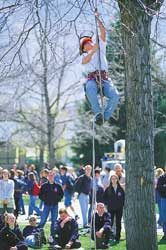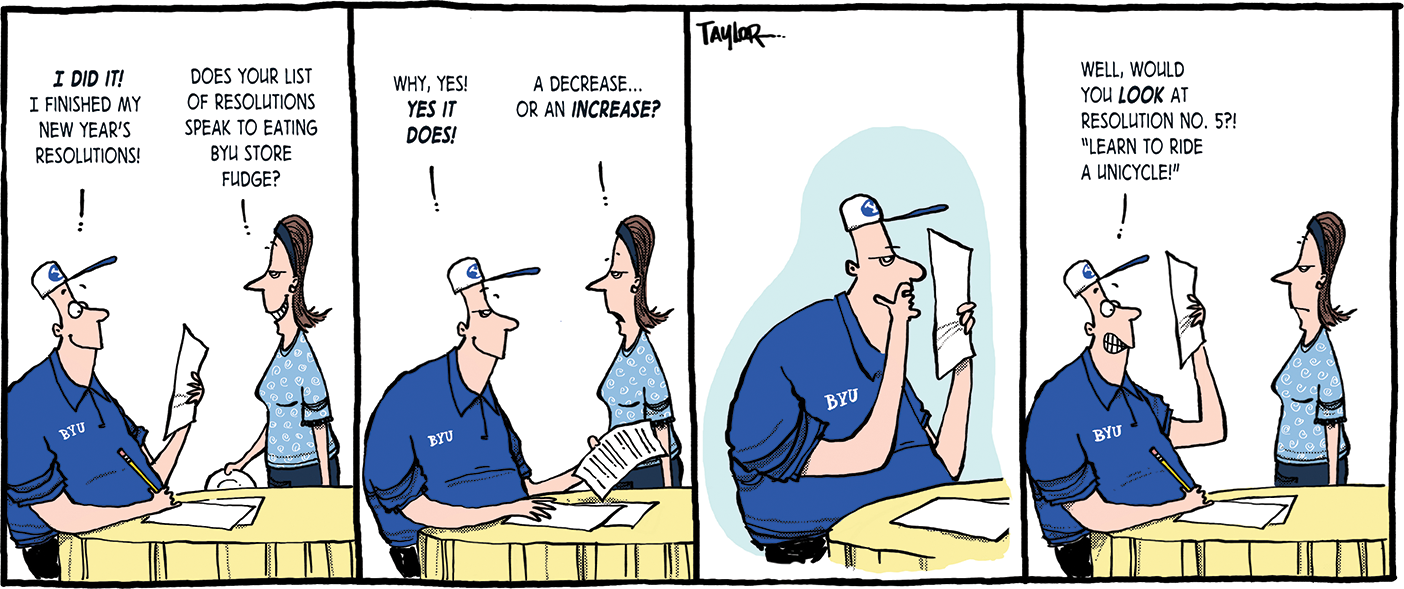
Kalyn Foster scales a campus tree, demonstrating some of the expertise that brought her and her horticulture teammates success in national competition.
By Megan Vandre
Students in hard hats strap on climbing belts and glance around nervously as potential employers gather near a few tall trees. It’s the arboriculture (tree care) event at the national landscape horticulture competition, and two BYU students are gearing up for a race that could help cultivate a budding career. The battle begins when one of them hoists herself horizontally up a tree trunk.
The tree-climbing pair were among 21 BYU students who competed in the national Student Career Days competition sponsored by the Associated Landscape Contractors of America (ALCA). It was only BYU’s second trip to the annual competition, but the team flourished: three members earned first-place laurels.
Mimi Chipman, a senior from Plymouth, Minn., reaped BYU’s most prominent award. She took first in the sales presentation event, which involved role-playing as a sales representative for a landscaping firm. In 10 minutes, she had to convince a harried client to accept the firm’s proposal, which included a budget bid $15,000 higher than the client wanted to spend.
Phil S. Allen, an associate horticulture professor and the students’ faculty adviser, says the sales event was where BYU blossomed. “To win that is pretty great exposure,” he says. “We’ve had a lot of companies contacting us just on the basis of that.”
April M. U’ren, a senior from Orem, Utah, and Daniel R. Heid, a senior from Fallbrook, Calif., also garnered first-place titles at the 46-school competition. In the personnel management event, each was given a case scenario and had 30 minutes to prepare a response. Other BYU winners included Ryan Larson, a senior from Las Vegas, and Erik Zirker, a senior from Moscow, Idaho, who placed second in the irrigation installation event. Larson also gleaned a $500 scholarship for his strong academic performance.
Cougar women made an impact as 15 of BYU’s 21 Career Days competitors. Kalyn Foster, a senior from Gig Harbor, Wash., and Shanan Shorter Hambrick, a senior from Lynchburg, Va., placed 8th in the three-part arboriculture event. Along with timed tree climbing, they completed a throw ball event, which involves anchoring a weighted rope in a specified tree branch, and took a written test on common arbor pests. As the only all-female arboriculture team, Foster and Hambrick surprised some of their competitors by beating 17 men’s teams.
“Most of the men’s teams that had done really well said, ‘You guys were so good,'” Hambrick says. “They were really impressed with our skill.”
Though inexperienced in wood construction, junior R. Mindie Dykstra and sophomore Emily Elmer–both from Washington state–were the highest placing women’s team on typically male- dominated turf. Their challenge was building a mystery object in less than two hours, using only two electric tools.
All of the winning students harvested jobs or internships, which Allen says are BYU’s reason for going to Career Days. Chipman’s win, for instance, brought her multiple job offers. Non-graduating students also made connections; Dykstra landed an internship with a Florida landscape company, and Heid chose to work for ALCA president Steve Glover, a BYU alum.
Much of the team’s success stemmed from campus internships they had already filled. In fact, Hambrick says her BYU internship was more valuable than classwork in preparing her for jobs and competition. For the past 18 months she has worked on campus, pruning BYU’s approximately 12,000 trees with campus arborist Max Darrington.
Darrington, a 1986 BYU horticulture graduate and BYU’s arborist since 1990, teaches his crew of four or five students all about tree biology. Interest is so high that some horticulture students wait months for positions to open up. And those who work with him quickly adopt Darrington’s love for trees. “I don’t have to do much to share my love of trees with them,” Darrington says. “Just help them understand how the tree works and let them do the work, and it comes naturally.”
That’s what happened for Hambrick. During her time on the grounds crew, she came upon a Campus Drive accident: a car had hit a tree. After the people were cleared, Hambrick examined the tree for injuries, concerned because her love for trees–especially BYU’s trees–had grown so much. She says working for Darrington changed her view of Utah: what once seemed like an ugly desert is now a garden.
Other horticulture team members share Hambrick’s love for plants. Even U’ren, who is focusing on the business aspect of landscaping, says she loves being outside, gardening and pruning. And at a gathering of high school students in March, Foster articulated her passion for the industry this way: “Can you believe there’s actually a job where you get paid to climb trees?”









